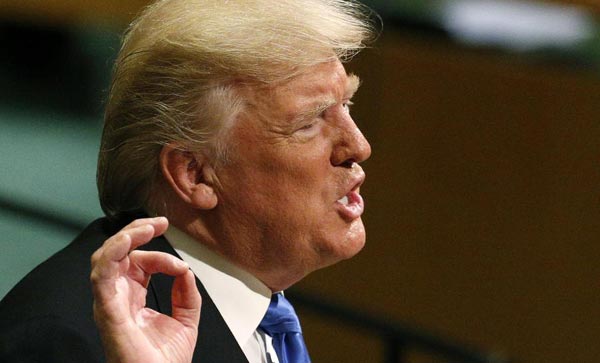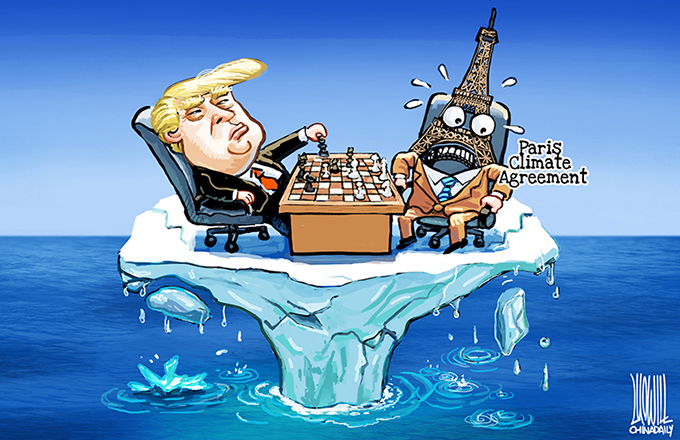Trump's speech at UN sends out troubling signals to the world
 |
|
US President Donald Trump addresses the 72nd United Nations General Assembly at UN headquarters in New York, US, Sept 19, 2017. [Photo/Agencies] |
US President Donald Trump's maiden speech at the United Nations General Assembly on Tuesday contained, to say the least, disturbing messages. Trump talked about the importance of respecting the sovereignty and rights of every country, saying "we must reject threats to sovereignty, from the Ukraine to the South China Sea", a clear jab at Russia and China.
Yet it was Trump who ordered the 59 Tomahawk cruise missile attacks on Syria on April 7 in clear violation of that country's sovereignty. Worse, he didn't even bother getting UN endorsement for the attacks, unlike what former US secretary of state Colin Powell did, albeit with false evidence, in February 2003 before the US invasion of Iraq.
The arming of the Syrian rebels by former US president Barack Obama's administration was another blatant violation of Syria's sovereign rights. US leaders did not care about such violations when Obama and his predecessor George W. Bush ordered military drone strikes on countries such as Afghanistan, Iraq, Pakistan, Yemen, Libya, Somalia and Syria, causing many "collateral" civilian deaths.
The NBC News reported on Monday that the Trump administration is contemplating additional policy changes that will further expand the Central Intelligence Agency's authority to carry out drone strikes in a number of countries. Trump, if indeed, is contemplating such a move, will dwarf Obama who had dramatically increased the number of US drone strikes during his eight years in office.
When Trump referred to his administration's recent announcement that "we will not lift sanctions on the Cuban government until it takes fundamental reforms", he meant the US will continue to violate the sovereignty of Cuba. The US embargo, imposed more than half a century ago, has caused untold sufferings to the Cuban people.
Trump might not be aware or refuse to acknowledge that the US is isolated on this matter. The UN General Assembly members, including US allies from Asia and Europe, have condemned the US embargo on Cuba throughout the past 25 years. The US abstained last year for the first time, but then Obama, who made the move to regularize ties with Cuba, was in office. Trump's words would only trigger continued condemnation from the UN General Assembly for the 26th consecutive year.
Shortly after his opening remarks, Trump said the US will spend almost $700 billion on its military and defense, claiming that "our military will soon be the strongest it has ever been". But is that a message a flexing of military muscles or an invitation to an arms race? The US spends more on its military than at least the next five countries combined.
The US often describes China's defense spending as a threat to regional and global peace. But that is a cunning way to distract people's attention from the huge amount of US taxpayers' money being wasted on the military industrial complex.
Trump once again revealed his love for war (or war of words) when he threatened to "totally destroy North Korea" despite every other country saying that there is no military solution to the Korean Peninsula problem.
Unlike those living in the region, Trump has not realized that a total destruction of the Democratic People's Republic of Korea would be catastrophic for the Republic of Korea and, to a large extent, Japan. It's another matter that the threat of using military power is not at all conducive to denuclearizing the Korean Peninsula.
Trump made his disdain for the UN public when he tweeted last December that the world body is "just a club for people to get together, talk and have a good time". He might have enjoyed his speech on Tuesday, but might not have realized that many in the UN General Assembly were not having a good time while he was sending out his disturbing messages.
The author is deputy editor of China Daily USA.
chenweihua@chinadailyusa.com

























